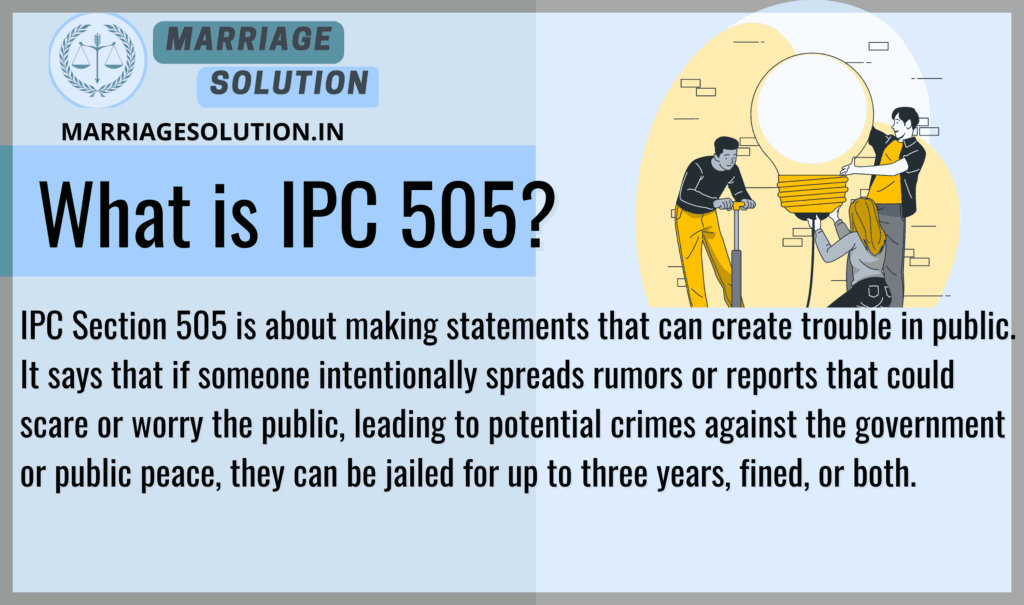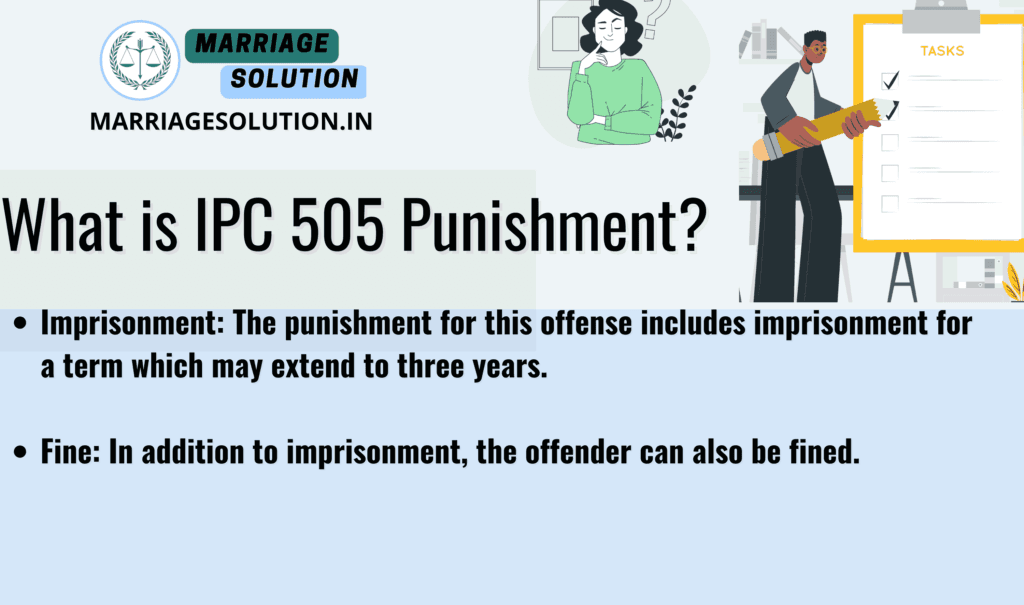Introduction of IPC Section 505
IPC Section 505 deals with spreading statements, rumors, or reports that could scare or worry the public. The law aims to stop activities that might cause trouble or lead people to commit crimes against public peace. If someone breaks this law, they can be put in jail, fined, or both. IPC Section 505 is meant to keep peace and prevent actions that could disturb society.
What is IPC Section 505 ?
IPC Section 505 is about making statements that can create trouble in public. It says that if someone intentionally spreads rumors or reports that could scare or worry the public, leading to potential crimes against the government or public peace, they can be jailed for up to three years, fined, or both.

IPC Section 505 Overview
IPC Section 505 addresses making statements that could lead to public trouble. This law says that if someone intentionally spreads rumors or reports to cause fear or alarm among the public, potentially encouraging people to commit crimes against the government or public peace, they can face imprisonment for up to three years, a fine, or both.
Key Points
- The Offense – Mischievous Statement:
- IPC 505 covers the act of making, publishing, or circulating statements, rumors, or reports.
- These actions are intended to cause fear or alarm among the public or specific sections of the public.
- Intent or Likelihood of Causing Fear/Alarm:
- The offender must have the deliberate intent to create fear or alarm.
- Alternatively, the statement must be reasonably likely to induce fear or alarm in the public.
- Inducement to Commit Offenses:
- The statement, rumor, or report should have the potential to encourage individuals to commit offenses against the State or disturb public tranquility.
- This involves inciting actions that go against legal norms or disrupt societal harmony.
- Punishment for IPC 505:
- Individuals convicted under IPC 505 can face imprisonment for up to three years.
- They may also be liable to pay a fine, depending on the severity and impact of the offense.
- Bailable Nature of the Offense:
- IPC 505 is classified as a non-cognizable and bailable offense.
- This means that while the police require a warrant for arrest, the accused has the right to seek bail as a matter of legal entitlement.
- Preserving Public Order and Tranquility:
- The primary objective of IPC 505 is to maintain public order and harmony.
- By regulating harmful statements and rumors, the law aims to prevent societal disruptions and ensure public safety.
IPC 505 Punishment
- Imprisonment: The punishment for this offense includes imprisonment for a term which may extend to three years.
- Fine: In addition to imprisonment, the offender can also be fined.

505 IPC bailable or non bailable ?
IPC Section 505 is a non-cognizable and bailable offense. This means that if someone is accused under IPC Section 505, they have the right to seek bail as a matter of right. “Non-cognizable” indicates that the police cannot arrest the accused without a warrant from the court, and “bailable” means that the accused can seek bail during the legal proceedings without having to await trial in custody.
Section 505 IPC in short information
| Aspect | Explanation |
|---|---|
| Definition | IPC Section 505 deals with statements or reports that could lead to public mischief or induce others to commit offenses against public order. |
| Offence | Making, publishing, or circulating statements, rumors, or reports with the intent to cause fear or alarm to the public, potentially inciting criminal acts. |
| Punishment | Imprisonment for up to three years, a fine, or both. |
| Bailable | Yes, IPC Section 505 is a bailable offense, allowing the accused to seek bail as a matter of right during legal proceedings. |
IPC 504 FAQs
What is the essence of the offense under IPC 505?
The essence of the offense under IPC 505 is making, publishing, or circulating any statement, rumor, or report with the intent to cause, or which is likely to cause, fear or alarm to the public, or to any section of the public, whereby any person may be induced to commit an offense against the State or against public tranquility.
What is the maximum punishment for the offense under IPC 505?
The maximum punishment for the offense under IPC 505 is imprisonment for a term which may extend to three years, or a fine, or both.
Is the offense under IPC 505 bailable?
Yes, the offense under IPC 505 is non-cognizable and bailable, which means that the accused can claim the right to be released on bail as a matter of right.
If you need support with court proceedings or any other legal matters, don’t hesitate to reach out for assistance.
Court or any other marriage-related issues, our https://marriagesolution.in/lawyer-help-1/ website may prove helpful. By completing our enquiry form and submitting it online, we can provide customized guidance to navigate through the process effectively. Don’t hesitate to contact us for personalized solutions; we are here to assist you whenever necessary!
